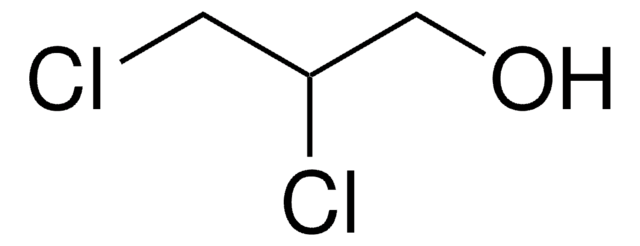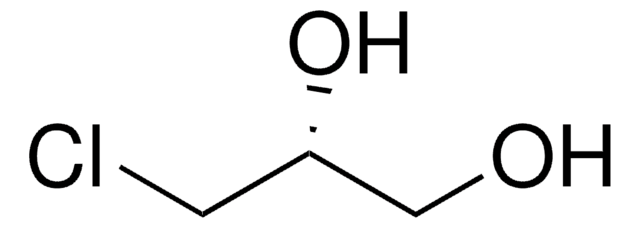184489
1,3-Dichloro-2-propanol
97%
Sinónimos:
Glycerol-α,γ-dichlorohydrin
About This Item
Productos recomendados
Quality Level
assay
97%
form
liquid
refractive index
n20/D 1.483 (lit.)
bp
174.3 °C (lit.)
mp
−4 °C (lit.)
solubility
water: soluble 10 part
alcohol: miscible
diethyl ether: miscible
density
1.363 g/mL at 20 °C
1.351 g/mL at 25 °C (lit.)
functional group
chloro
hydroxyl
SMILES string
OC(CCl)CCl
InChI
1S/C3H6Cl2O/c4-1-3(6)2-5/h3,6H,1-2H2
InChI key
DEWLEGDTCGBNGU-UHFFFAOYSA-N
¿Está buscando productos similares? Visita Guía de comparación de productos
General description
1,3-Dichloro-2-propanol is used as a pharmaceutical intermediate and solvent for paints, lacquers, and epoxy resins.
Application
- Hydroxyl-N-tosylcyclams via sodium ethoxide catalyzed cyclization reaction with di(poly)-N-tosylamides.
- (R)-Epichlorohydrin using biocatalysts.
- 1,3-dichloropropene, a soil fumigant, and synthetic glycerol.
It can also be used as an intermediate in the production of epoxy resins, as well as a solvent for hard resins and nitrocellulose.
signalword
Danger
hcodes
Hazard Classifications
Acute Tox. 3 Oral - Acute Tox. 4 Dermal - Carc. 1B
Storage Class
6.1A - Combustible acute toxic Cat. 1 and 2 / very toxic hazardous materials
wgk_germany
WGK 3
flash_point_f
186.8 °F - closed cup
flash_point_c
86 °C - closed cup
ppe
Eyeshields, Faceshields, Gloves, type ABEK (EN14387) respirator filter
Elija entre una de las versiones más recientes:
¿Ya tiene este producto?
Encuentre la documentación para los productos que ha comprado recientemente en la Biblioteca de documentos.
Los clientes también vieron
Nuestro equipo de científicos tiene experiencia en todas las áreas de investigación: Ciencias de la vida, Ciencia de los materiales, Síntesis química, Cromatografía, Analítica y muchas otras.
Póngase en contacto con el Servicio técnico








